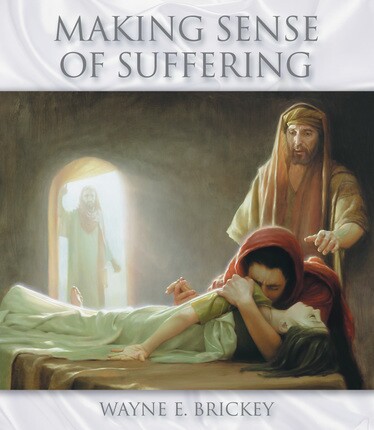When you lose a spouse, you wonder, How can life possibly go on? How am I supposed to get through this? How am I even supposed to get out of bed? It’s hard, but you can do it—even if “doing it” means making it to the grocery store in your pajamas. Be patient. Time doesn’t make things entirely better, but it does make them easier. Here’s some advice on how to cope with your new life or how to treat someone who has recently lost a spouse, from widows and widowers who have already been there.
If You’ve Lost a Spouse
Don’t Lose Your Testimony
“Don’t be mad at God,” says Carmen Crane Peterson, who lost her husband at age 31. “Don’t blame it on Him and then stop going to church. For me, it was the gospel that got me through it.”
Peterson has several friends who stopped going to church after their spouses died, and they are still struggling. Staying active in the Church and keeping her testimony were the most important aspects of her healing process.
Join a Widow/Widower Group
This group can be a professional counseling group run by therapists or an informal group of people who get together as friends.“That helped me because . . . I didn’t feel like I was so alone. There were actually people who survived,” Peterson says.
She recommends going on vacations with these friends, grabbing lunch together, or planning other fun activities with them to get your mind off of the hard things, if even for a short while.
But be careful not to treat the group as a crutch. At first you will need it to heal, but there will come a point when you’ll need to start dealing with your new life on your own, says Kelly Kimber, who lost his wife at age 45. “The longer I stayed in my widow/widower group, the longer I stayed hooked into the whole philosophy of ‘I’m a widower. I’ve lost my wife. Poor me.’ I chose to break away from that group, and that was like the next phase of being able to move on.”
Exercise
“If you let yourself, you can stay in bed all day and just sleep,” Peterson says. “For me, exercise was a way to get out and get myself out of bed.” In addition, exercise produces endorphins that can help with the grief. It can make you a little bit happier, even if it just lasts for a day.
Don’t Rush into Relationships
“I started dating way too soon and basically had an emotional meltdown,” Kimber says.
A lot of people think they are ready to start dating within that first year, but when they look back, they realize they weren’t. In Kimber's experience, friends who rush into another marriage often end up divorced or are unhappily married. The loneliness made them fill the void, but in the end, they weren’t emotionally ready for such a big decision. “You need time to heal," he cautions. "If you try to move forward before you’re ready, it just creates a whole bunch of other problems.”
Read a Self-Help Book
Books on grief and losing a spouse can bring a new perspective to your suffering and show you ways other widows and widowers dealt with their losses. Some favorite books of LDS widows and widowers include
Don’t Feel Obligated to Comfort Others
“People are going to come to you because they are grieving and they want comfort,” says Michelle Johnson, who lost her spouse at age 37. “They want to see you be okay so that they can be okay. But it is not your job to comfort them and make them feel better.” She recalls trying to put on a happy face and make others feel better about her husband’s death, but it became exhausting, and she felt like she was never able to grieve herself. Once she stopped trying to comfort others, her healing process began.
Keep Your Physical Desires in Check
A lot of people are unprepared for the physical desires that don’t shut off once their spouse is gone, Kimber cautions. He warns against letting those emotions control your actions. “You’re so vulnerable and lonely, and you just want to be held by somebody,” he says. But these feelings can be dangerous if you’re not extremely careful and aware of your limits.
Don’t Make Big Decisions . . . Yet
Don’t move, get rid of your spouse’s things, change your environment, or make major financial decisions for at least a year, Johnson advises. Try to keep some sort of stability in your life. The first while can be a very emotional time, and some of these decisions can’t be undone. You don’t ever want to regret something you did in an emotional state.
Realize People Don’t Mean to Say Hurtful Things
Friends and associates don’t know what to say but oftentimes feel like they have to say something, so they end up saying unintentionally hurtful things. “Recognize that unless you have lost a spouse, it’s difficult to understand. Give people the benefit of the doubt because most people don’t mean to hurt you,” Kimber says. "If you get upset every time somebody says something stupid, you’re going to be upset a lot, and it’s just not worth it."
Don’t Feel Guilty for Surviving
A lot of spouses feel guilty for moving on and being happy, but your late spouse wouldn’t want you to sit around and cry all day forever, Johnson says. Life goes on, and you can either stay at home and cry
or start living your life again when you’re ready. It’s okay to have fun and smile. Just because you’re happy again doesn’t mean you never loved your spouse.
If Someone You Love Has Lost a Spouse
Avoid Asking Cliché Questions
“How are you doing?” is Johnson’s least favorite question in the world. “How am I supposed to answer that?” she says. “If people really wanted to know how I was doing, they would ask specific questions like, ‘Are you eating?’ and ‘How are you sleeping?’ and then they would try to help me fix whatever specific problems I was having.”
Understand That Everyone Grieves Differently
Some people are back to normal within months, but for others it takes years. “Be sensitive to the way people handle their grief,” Peterson says. "Everybody’s situation and marriage is different, and both affect the grieving time."
Offer Specific Help
Phrases like “Call me if you need help” and “Let me know if I can do anything” can be unhelpful to a widow or widower because they don’t know what kind of help they really need. “I felt so overwhelmed, and I needed someone else to take charge,” Johnson says. She loved it when friends made appointments to come over and help with chores, meals, or just to talk. If you don’t set a specific time and date, the widow or widower will likely never follow through.
Don’t Compare Your Experiences with Death to Theirs
A lot of people with good intentions try to make a widow feel better by saying something like “I know how you feel.” Even if you, too, have lost a spouse, you can’t compare your loss to someone else’s. Every marriage, every relationship, and every situation is different, so comparing your experience to theirs is likely to hurt feelings rather than heal them. It’s best to just say something like, “I’m so sorry for your loss.”
Invite Them to Social Gatherings
When someone loses a spouse, they lose more than a husband or a wife—they lose their identity. They’re no longer a husband or a wife, a couple, or a traditional family unit. Suddenly, they feel like they don’t belong anywhere anymore. Johnson says she lost a lot of couple friends when her husband died. “You go from a full social life to nothing.” She recommends inviting them to social gatherings just like you would have if their spouse were still alive.
Helping a Child Who Has Lost a Parent
Get Your Kids in Counseling
Most kids need some kind of therapy, but they’re not old enough to make that decision for themselves. As their parent, you need to take charge and get them help. Group therapy can help them see that there are other kids in their shoes. If your children can see other kids who have lost parents still having fun, it gives them permission to have fun, too.
Don’t Let Your Kids Lose Another Parent
“Unfortunately, I became a recluse, so my kids not only lost their mom, but their dad [too],” Kimber recalls. As he was mourning, he pulled away from everyone, including his kids. He warns other widows and widowers not to be physically or emotionally absent for your kids. "They need you more than anything right now."
Let Them Talk
Allow your kids to talk about their deceased parent, even if it’s emotionally hard for you. The last thing you want to do is pretend like your spouse never existed.
Celebrate Their Parent’s Life
Let them help plan celebrations or memorials for special days like birthdays, the death date, or Mother’s Day and Father’s Day. Let them pick what they feel comfortable doing and allow them to express their love in their own way.
When Michael Wilcox’s wife, Laurie, was diagnosed with an inoperable brain tumor that would ultimately take her life, he began keeping a journal to record what he was learning about living, loving, and grieving. Although at the time he was not intending that it would ever be published, he gradually came to recognize our “sacred covenant to share our burdens, our mourning, our comforts, and our witnesses.” The lessons he offers in Sunset: On the Passing of Those We Love are more than a chronicle of his own journey; they are important reminders to all of us to cherish every day we have with the people we love, to treasure the gift of our mortality, and to turn to the Lord in all our trials.
On Christmas Day 1998, Lance Richardson was involved in an accident which later left him in a comatose state for several weeks. While his body was being kept alive by medical support equipment, his spirit passed into the world beyond. In The Message, Lance describes his experience in the world of spirits and delivers to us a message giving a greater understanding of the importance of families and the future of America.
Drawing on decades of study and personal experience, Brother Brickey shows us in Making Sense of Suffering that afflictions are brief gifts from God's gentle hands. Our challenge is to bear our afflictions while reconciling our hearts to the will of the Father and the Son. "Mortal suffering makes lasting improvements in the eternal self," the author writes. "It turns up the volume on God's voice to us, and it turns up the volume on our pleadings to him." Filled with poignant examples of belief and endurance, Making Sense of Suffering helps us exercise faith and overcome fear. For anyone touched by disappointment, disease, disaster, and death, this important book offers comfort and provides valuable insights into the blessings promised to those who endure their trials on the road to eternal life.




